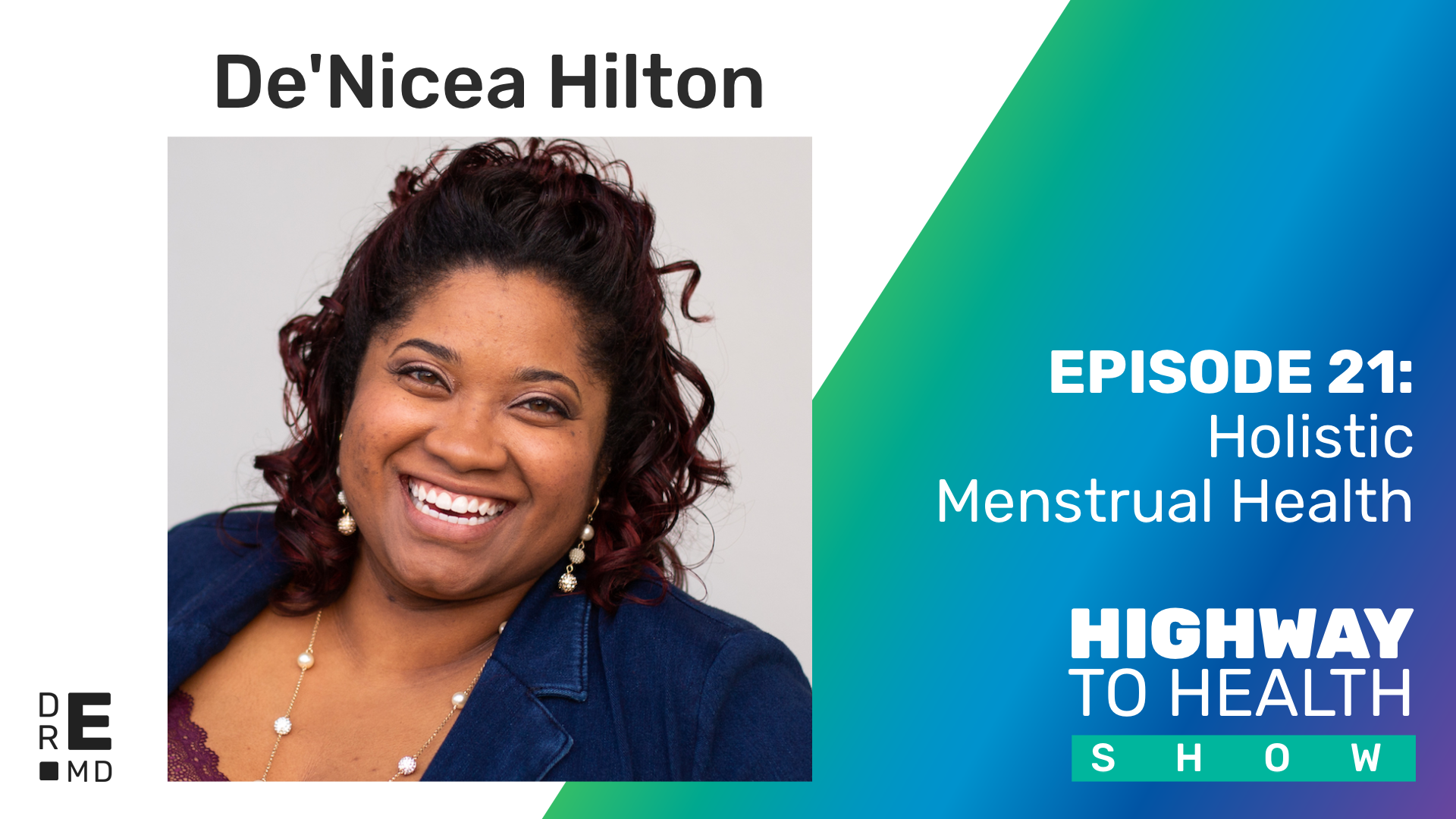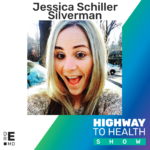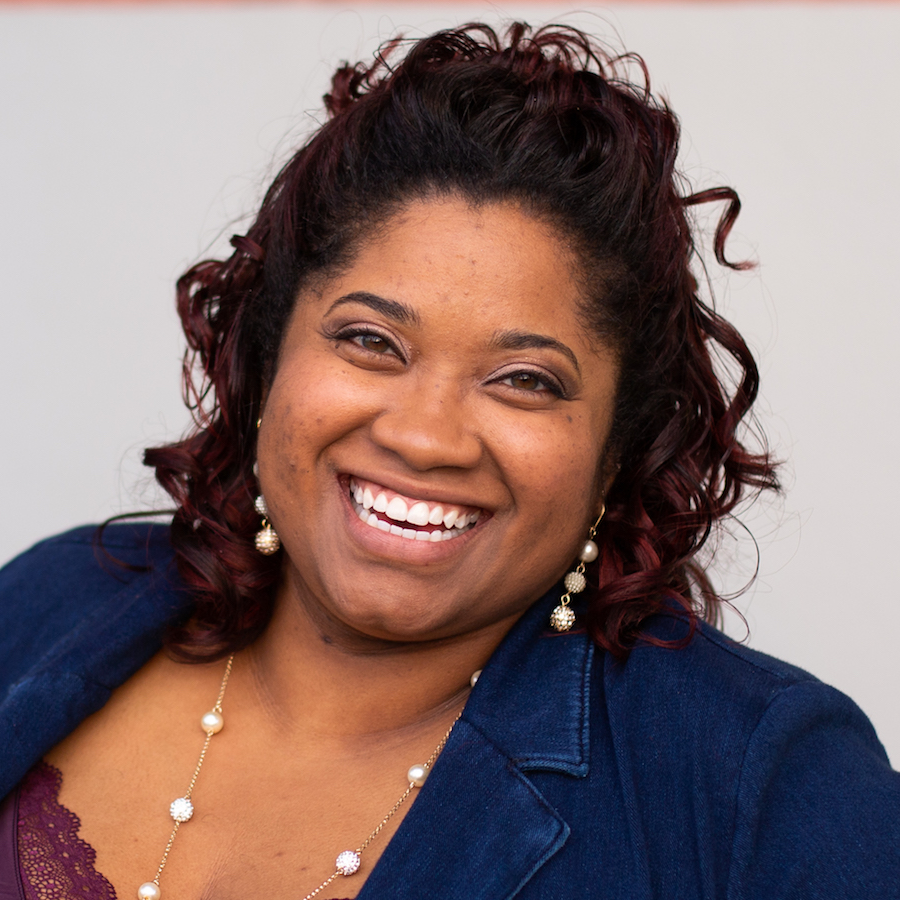Holistic Menstrual Health
Dr. E's Highway to Health Show Episode 21

In This Episode:
De’Nicea Hilton is a doctor or Oriental Medicine who specializes in holistic menstrual health.
In this episode we discussed what she refers to as “period bypassing”, the need for further education in regards to menstrual health, and a lot more.
Original Air Date: July 24, 2019
watch this episode

Subscribe to highway to health
Actionable Steps:
For Women
- Accept that menstruation and menstrual cycles are an important part of your biology which should not be avoided or “bypassed”.
- Observe what happens in your body, the changes it experiences and how you feel throughout your cycle.
- Chart and Journal your findings.
For Men
- Understand the menstrual cycle as something that happens throughout the month.
- Observe the changes and ask questions.
Questions About This Episode:
Episode Resources: Disclaimer:The links below can redirect to external websites where I may receive a small percentage of any purchases you make. This however, comes at no cost to you.
Other Resources
Related Episodes
Show Notes
- [00:03:23] What is holistic menstrual health.
- [00:03:36] How our environment interplays with our biology and affect menstrual health.
- [00:05:40] How traditional heatlhcare approaches menstrual disorders.
- [00:09:30] Why so many women get on birth control and are afraid of stopping it.
- [00:12:38] What is period bypassing.
- [00:15:18] Why it’s better to use menstrual cups or pads instead of tampons.
- [00:15:57] Tampons leach chemicals that are easily absorbed into the blodstream.
- [00:17:43] Chemicals absorbed through the vaginal canal affect hormone signaling and production.
- [00:19:16] How young women are indoctrinated to believe that having a period is a nuisance.
- [00:20:43] The importance of educating (men and women) in regards to holistic menstrual health.
- [00:22:02] The menstrual “health” industry is constnatly adding more needs and products to push on young women which are aimed at addressing the “nuisance” that is menstruation.
- [00:26:39] How empowering women in terms of menstrual health can permeate in other areas of their life.
- [00:28:31] There are a lot of financial interests in the feminine hygiene product industry.
- [00:29:54] Women must start by accepting themselves as women. Healthy, fertile, women.
- [00:30:55] Schools are doing a disservice to everyone by not educating both boys and girls about menstrual health.
- [00:34:25] Actionable steps
- [00:37:17] Follow De’Nicea Hilton
- [00:37:51] Dr. E’s closing remarks
- [00:40:57] Outro
Dr E: [00:00:01] Hello and welcome to The Highway to Health Show. In today’s episode I’m joined by De’Nicea Hilton. She is a doctor of Oriental medicine and a holistic period and fertility strategist.
Dr E: [00:00:11] Her mission is to inspire women seeking holistic methods to support their quest not only for relief from menstrual cycle conditions, but for a more aligned and expressed whole being.
Dr E: [00:00:21] Let me just start by saying that this was not the conversation that I was expecting. The topics that we touch regarding menstrual health and fertility are rarely discussed and I feel tremendously important. I am very happy that I was able to provide a place for De’Nicea to share her message and mission. If you’re a woman, you will surely identify many of the things we discuss, obviously. But I also want to let all the men listening know not to skip this episode. Seriously. These are things you need to know about for your sake and the sake of the woman in your life. Trust me.
Dr E: [00:00:50] Last week we had Dr. Gordon Pedersen on the show. He is a clinician, a researcher and an entrepreneur who has been involved in health and wellness industry for several decades. During our conversation, we spoke about his concept of the essence of wellness, as well as gut health, how our microbiome affects our mood and about all the benefits of silver as a healing tool. That was on Episode 20, in case you missed it. But before we get to today’s episode, remember that this as well as every other episode are brought to you by our Highway to Health Facebook group. If you haven’t yet joined us, you can do so by heading over to dre.show/group and click on the appropriate button. You can also find that link on this episode description, by the way. And now here’s my conversation with De’Nicea Hilton. I hope you enjoy it. And remember, you’re on The Highway to Health and I’m your guide to get you there.
Intro: [00:01:36] Are you ready to live ageless? Want to discover alternative health choices? Cutting edge nutrition and fitness for the entire family? Welcome to Highway to Health Show with your host, Dr. E ‘The Stem Cell Guy’. Where Dr. E helps you live ageless. And now here’s your host, Dr. E.
Dr E: [00:02:02] Hello, everyone, welcome to another episode of The Highway to Health. I’m your host, Dr. E ‘The Stem Cell Guy’.
Dr E: [00:02:06] And joining me today is De’Nicea Hilton. She’s a doctor of Oriental medicine and a holistic period and fertility strategist.
Dr E: [00:02:14] Her mission is to inspire women seeking holistic methods to support their quest, not only by relief from menstrual cycle conditions, but for a more aligned and expressed whole being. I was just talking to De’Nicea before we started this recording. And what she’s doing is incredibly interesting. And I’m not afraid to accept that I’m not very knowledgeable on a lot of these topics. I’m sure this is gonna be a very interesting conversation, not just for me, but for everyone joining us. So I’m very, very happy to welcome you, De’Nicea. Welcome to the show.
De’Nicea Hilton: [00:02:43] Thank you so much Dr E, I appreciate you having me.
Dr E: [00:02:46] Well, thank you for accepting the invitation. I think this is a great, great topic. And honestly, now that we were sharing about this, it really opened up my eyes as a traditionally Western trained medical doctor as to how little, unless you go into a specific area of medicine, how little we’re actually trained and knowledgeable about many of these things in this particular case, and especially as a man, you know, in terms of fertility and how it relates to periods and all those things. So before we get really into it, why don’t you just tell us what your concept is of menstrual health as you were sharing with me?
De’Nicea Hilton: [00:03:23] Yeah. So holistic menstrual health is really taking into consideration not just the physical components of the menstrual cycle, but the mental, emotional and spiritual components as well.
De’Nicea Hilton: [00:03:36] And even linking that in, that’s her. So the physical, mental, emotional, spiritual, and then also taking into consideration her environment. So I totally believe that we are always fighting with our environment. So whether or not you’re conscious of it, your environment’s there and it’s an interplay. Right? So it’s all of those components that play a role into how her menstrual cycle is presenting itself. So it’s a different perspective. Right? So it’s a shift of, OK. Well, women are going to menstruate. It’s only there. We’ll see if they can reproduce. Right? Whereas from this perspective, it’s actually here’s our menstrual cycle. This is the way that it’s showing itself beyond just the active bleed time. But this is how it’s showing itself. And that is actually representing what is going on for her internally on the physical, mental, emotional and spiritual levels. So in Eastern medicine, one big thing is that we look at the whole person. So, we’re looking at the symptoms as these symptoms are letting us know that the organ systems are not playing well together or that they’re disharmonized. So we see the symptoms as, OK, these are clues calling our attention. So that’s how I see the menstrual cycle. So when I say the cycle, most people think, oh, it’s just when she’s bleeding. But then no, I’m actually talking about cycle day one all the way through to the next cycle, day one. So we know that there’s so many hormones that are at play and that they’re all going through their ebbs and flows. They’re communicating hopefully in a healthy feedback loop throughout that whole time, throughout that whole process. So we’re hoping that there’s a really healthy shedding. We hope that there’s eggs maturing. We hope that something ovulates, then we hope, you know, should there be that they’re trying to expand their family, that there’s conception and makes its way safely down to the uterus.
De’Nicea Hilton: [00:05:40] So we hope that’s all happening during that time frame. And what’s happening is that there’s so much focus on. Well, if there’s pain, just take ibuprofen or if there’s heavy bleeding. Oh, just double up and triple up on pads. And then for that, go by for a few months and then not go see their doc. And then most of the time this is and you can correct me if I’m wrong, but this is what I’ve heard and it happened to me as well. OK. Well, here are birth control options. And so with those tactics, that’s just covering up. Right. So when you look at the cycle and you’re saying, OK, well, let’s just break this down, if she’s having complaints mostly during the premenstrual period, that concept of period bypassing an example is that she’s just PMS-ing. We’re just going to leave her be. But really, she could be progesterone deficient. So if she’s progesterone deficient then what’s causing that deficiency? Or better yet, how about explaining to her that during that time period, those hormones that are predominating during that luteal phase is actually the timeframe of where she’s actually going to just be a little bit more frank and what it is that she’s wanting to say. She’s not sugar coating it like one that’s more estrogen dominant, right? During that time period. So how about actually letting her know that this is potentially going to happen? But then now she’s more aware and then because she’s more aware, she’s like, oh, OK, well, then I can’t express that and not have to be mean about it.
De’Nicea Hilton: [00:07:20] But it is a way that I can express myself when I’m going to be more frank. So it’s that when you really take a look and you notice that I pointed out some physical things that I also did point out the mental. And then I pointed out emotional and it’s all throughout the whole cycle itself.
Dr E: [00:07:36] That’s what’s interesting from what you’ve said. And it goes not against, but it just goes a lot deeper into the understanding and the training that we’ve had on this where it’s purely biological in terms of, OK.
Dr E: [00:07:51] So this is happening. And obviously you go into the different cycles and the different phases and the different hormones as to how they happen. But when you bring in as well the psychological or the mental and you’re taking into consideration all the external that surround this person in terms of environment. And environment, you know, we’ve done a couple of episodes here in environmental medicine and how our environment plays a role in this. And it’s things not just people. When they hear environment, they think it’s or where I live. Of course it’s where you live. But also, what are you exposed to? What’s your diet like? What is your lifestyle like?
Dr E: [00:08:28] What are the things you’re doing? And it’s very interesting to see somebody actually start to address many of these different signs and symptoms of really an unhealthy period, because nowadays it’s so common to have all these terrible pains during your menstrual cycle.
Dr E: [00:08:47] You know, my wife, she has awful a lot of the times, very severe menstrual cycles. And she had been taking, for instance, birth control pills. So she’s been on birth control pills since she was a teenager. And then she stopped and then she got pregnant and then she was feeling OK. Then she got is it the IUD?
De’Nicea Hilton: [00:09:09] Yes.
Dr E: [00:09:09] So she got that one. And again, super painful and she just can’t wait to get off it. But she’s scared. Because now she’s gonna have all these awful periods again. So what you’re saying is and I’m sure she’s far from alone. What you’re saying is that this is not just a bad draw of cards. Something’s going on.
De’Nicea Hilton: [00:09:30] Correct. Yeah. And it’s happening, you’re right a lot. Unfortunately, it’s happening a lot. And there’s something that you pointed out. So it’s like sticking right out of my mind that’s going on with your wife in a way that she’s thinking, because. Yes, there is. Being on birth control for so long and all but your memory is what was happening before you went on it. And then despite whether or not it may have gotten better. Right. So for some and make it better some it’s like, oh, it took the edge off. But they become so scared of what they think is going to happen again. Right? And then that ends up leaving them in this vicious cycle. Of well, it’s not really helping me. It’s actually affecting me in other ways. But I’m still going to stay on it because I just don’t want to experience that experience. The horrible pain with her periods. And that’s where a little bit of my frustration has led to me to talk more about the intricacies of the menstrual health, because it’s helping her to see what’s going on and then how it is that we can support you where the pain is diminished. That becomes a side effect because we’re actually helping to support and harmonize these organ systems. And then, yes, the side effect is the cycle ends up becoming more of a healthy cycle. I don’t like to say normal because when we say that it’s normal or I’ve had patients come in, they say, well, they told me that it was normal. And so they just whatever. And the thing is, is that it’s only normal because you see it so often.
Dr E: [00:11:06] Yeah. So it’s really more about it being common, not necessarily being or even normal, but not necessarily being healthy. We’re so used to seeing most of these things. And I’m really, really surprised as to how common you start seeing teenagers really, then you start seeing young women with all these symptoms. And they’ve been having it for a long time.
Dr E: [00:11:30] And it is for me very surprising the lack of real, reliable, thorough, deep information and education in terms of menstrual health. And even if you just want to call it simple biology, most don’t fully understand it. I mean, let alone men, but women barely understand what’s going on. They just think, as we were saying earlier, I don’t remember if, you know, at the beginning of this recording or before we went on that. You were saying that what’s most common and I agree with you is that people think that the period is just that. OK, well, I bleed once a month, right? For a couple of days and then it goes away. And if I’m lucky, I don’t have these terrible pains right before because some of my friends do. And some of the women are like super heavy bleeders. And of course, there’s some variability. Not everyone is to be exactly the same. But where should listeners or people interested in is, Where do they draw the line between, OK. This is part of the normal variability, and this is it. So I need to seek out help or I need to educate myself. Where’s that line drawn?
De’Nicea Hilton: [00:12:38] A line. Here you go. So there are some things that I look for. I do want to point out that the education part. This is where the education system is bypassing its period bypassing because they are weaning out or have completely taken out education when it comes to mesntrual health. So, we do see a problem there with school administrators and school nurses that they are trying to figure out how to even handle this because it’s not being taught anymore. And even then, what may be taught is even misleading. So, yes, we do have that issue there and it’s my primary mission and working on trying to get in there to help with that and to help with understanding what is menstrual health. So some guidelines that I use when I have a woman come in or a teen come in and we’re assessing her cycle. So I let her know these are some of the guidelines that I’m looking for. So I’m looking for a nice even blood flow that is bright red, right, for about three to five days. No spotting before or after. It is a cut on and then cut off. Very limited to no bleeding. Very limited to no clotting.
De’Nicea Hilton: [00:13:49] And then also as she progresses through that cycle, then I’d want to hear that there are some nice vaginal moistness that would just slightly increase to where it’s a little bit more of a discharge and then it turns more from opaque, to a little bit more of an egg white consistency for about a day or two. And then we get drier, not dry in the sense that there’s vaginal dryness, but just that it’s not enough. That’s really coming out anymore. And even when that happens in the middle of a cycle, that there is no pain that’s also happening during that time frame and no bleeding that’s also happening during that time frame. And then she has to progress through the rest of the cycle with very limited to no breast tenderness, very limited to no bloating. There is a subtle difference of sensations. So what I’ve noticed is that as I teach them and I guide them through it because their awareness is now in their body, they now have become more sensitive to the subtleties. So she might actually feel the uterus. It’s expanding, right. So as it’s filling up. And so she might start feeling this heaviness. And she might start feeling like something is about to happen. So that’s that like gray area of it’s not necessarily symptomatic as much as it is sensation. Like she’s just really feeling into herself and she’s feeling when these things are happening.
De’Nicea Hilton: [00:15:18] And then also, I always suggest using either a menstrual cup or a pad because it really does allow the flow to come out. And then also you’re better able to assess and see like what’s the quality of the blood as it comes out. And then, that way you’re able because there have been some that have switched over, and as soon as they switch over their blood flow changes. Like within about two to three cycles. Like the pain will decrease and then even the amount that they’re even seeing had decreased as well. So even some things when we switched them over from their products, I’m asking them, what are you using?
De’Nicea Hilton: [00:15:57] And so we’re even switching out the products to where there’s not chemicals in it. And it’s almost like we were saying with the environment, especially for women, the number of products that we use on a daily basis. And now you use a tampon or pad that’s right there where the permeability that’s there with those cells is so high that these chemicals are just going right into the bloodstream. Right. And so even by just switching products, there has been a huge change in the way that our cycle is presenting itself, because there’s just you’ve reduced this toxic load on your body.
Dr E: [00:16:33] I had heard something or had read something about the tampons and all the potential dangers, because you’re absolutely right when you put something inside a mucosa or in this case, in the vagina. And all these different mucosas are in contact with it. You’re constantly absorbing all of that. Correct? So you have to be very, very mindful. And when you think of all these things and you think of, OK, well, they’re made of cotton and they have all these different materials that are supposed to absorb moisture. Then some of that also is being absorbed by the body. So how much of a role do you think this plays in affecting all these things? I mean, I know how all these different chemicals can affect how we create our hormones and how we communicate internally. Even, you know, the research is out there that even plastics and things like that are affecting our hormones. So how about putting something right there that is constantly seeping out chemicals that you’re actively absorbing throughout the day, especially in a stage like during the menstrual cycle? How much of a problem do you think this is?
De’Nicea Hilton: [00:17:43] I think it’s a huge problem because just think of the proximity. And then it’s right there and it’s the chemicals that’s in it, to make these tampons to absorb or these pads to absorb. It’s the bleaches that are used. It’s the pesticides that were used. It’s the synthetic fragrance that are used in all of that is right there where we easily can absorb. And yes, we’ll easily throw off the hormone production and even their function. Say, if she is a heavy bleeder, like I said, I’m looking for a bleed to be more of a three to five day timeframe. But there are many where they’re falling out of that. So there are some that are 7 days, some even up to 10 days. Imagine that about a third of the month you have something consistently there and consistently with this interplay. And it’s not even like, oh, well, if it’s there for 10 minutes and then your absorption level goes down, well, you have to change it out. So you’re constantly reintroducing this to your system. And then like I said, this is on top now of, say, the shampoo that she just used, the conditioner she just used, the leave-in conditioner, the deodorant, the lotion, the body wash. So this is on top of all of that. That is on a daily basis that she’s already using. Now that’s absorbing through the top layer of our skin. But then it’s even easier because of the mucosal layer in the vagina.
De’Nicea Hilton: [00:19:16] So I think that that plays a major, major role. And if you think it’s like tampon use it last time I checked is still number one as far as what’s being used by girls and by women that take some conversation around. Why? Right. I’ve had conversations with different women about when they might have started using tampons and some it was like that was the first thing that was introduced to them or some that it came later, that using tampons was their thing. But then it’s the discussion behind why the why how I interpret it is that she’s trying to pretty much act like she doesn’t have a period. And so we’ve created this culture of, well, it’s in your way, the period’s in your way. So let’s just block it. Once again, she’s covering it up. She doesn’t want to really accept that it’s there. You can literally just kind of be like, oh, I’m just gonna plug it up. Like at the buffet. I’m just gonna plug it up. I don’t want to deal with it. And so it ends up being that’s a part that’s another example of period bypassing even on herself because she’s not fully embracing that this is a natural occurrence for her. And then you can go back and say, well, how is it introduced to her in the first place? So everything that has been introduced has been in a way for her to continue to separate herself from a natural process.
De’Nicea Hilton: [00:20:43] So we’re going to cover it up with birth control and then we’re going to cover it up with ibuprofen or Tylenol or whatever. Then we’re going to just plug it up. So you don’t even have to see it anymore. And so even then, when you get into a holistic menstrual health, education is a huge part. When I have my patients, they know it is a lot of appointments because we’re educating and treating the questions that I ask them. They get so surprised. They’re a little bit like why you asking me this? But then at the same time, over time, she actually becomes really empowered and confident in that, because now she’s turned so inward into this is my body, this is my state, this is how I’m presenting. And she’s like, if anyone is going to know herself more than her, it’s just gonna be her. Right. So she is now so engaged into cervical mucus, like didn’t even know what that was, you know, or because what she was told was to wear a panty liner. See I didn’t even touch on that. So someone actually wear tampons or pads when they’re actively bleeding, but then wear panty liners for the rest of the month because now in that industry, the period bypassing example there is that there needs to be some floral freshness scent going on. I don’t know where that came from.
De’Nicea Hilton: [00:22:02] But there is some floral freshness that needs to be happening. Really not sure where this came from, but it’s supposed to smell all nice and flowery. And so now you have douches and you have these panty liners of these fragrances and then and then you have these sprays. So even then, they’re like yes, spray this down there. But then you don’t understand that once again, this is exposure to chemicals that are right there with that type of cell that’s just going to absorb into your bloodstream and interact with your hormones. And really, it’s masking. So it’s another way that it’s masking the problem. So if you’re attracted to those products, that means that you have an abnormal vaginal discharge. That means that your micro flora actually might be off where the vagina is supposed to be more acidic. Could it be more basic? And it’s throwing off the bacteria that’s there and it’s producing an odor. And if that’s the case, whereas that happening, let’s take a look at what you’re eating. Let’s take a look at what other things are you’re exposing in that area. Is it potentially a yeast infection? That’s very low, mild. Is it potentially a vaginal infection that’s very low? And it’s not as gross that it makes you say, let me go see the doctor, get this cultured or anything. But if you’re masking it with those products, there really could be something else going on.
Dr E: [00:23:38] I totally agree. I think the amount of yeast that is in our lives in general is incredibly high, and especially with the amount of sugars that we’re consuming left and right, the predominance or the prevalence of yeast pretty much everywhere. And in this case, specifically with women, it’s just something that needs to be addressed.
Dr E: [00:24:00] And like you said, very, very well, I think, because it’s not so gross that you think you need to go to the doctor, then you’re just masking it and you’re adding a spray and you’re adding all these other things that are just making matters worse. But I think that, again, goes back to the fact that there is no real education. And you’re absolutely right. The only education that we’re getting for all these things and I can assume it’s the same for most women. Obviously, there’s exceptions, but I think that for most women, now that you brought it up. You’re absolutely right. Every single ad that I’ve ever seen about feminine hygiene product focuses on the fact that being in your period is a nuisance and it is a problem and it is something that you should be able to live your life through it, normally, and without even having to think about it. So the whole focus of all these ads is about how you can forget that you’re on your period. The whole idea is to help you forget that you’re on your period, and obviously that’s attractive to the consumer. But the problem is that because we don’t have that education, because we don’t have that knowledge of the importance of the whole period and why the phases are necessary and what’s happening with women’s bodies at that time, I think that that’s what makes it really, really attractive, because if people really see it as a nuisance and all the information that they get from it is that, yeah, it’s a nuisance. It’s something that gets in the way of my everyday life and my enjoyment. Of course, I will want to bypass it. Right. So do you agree that that’s a big part of the problem?
De’Nicea Hilton: [00:25:38] Oh, yeah, definitely. It’s a huge part. Huge, major component.
Dr E: [00:25:42] Why do you think that there is such a big wide gap in that knowledge? Why do you think that’s happened? I know that for a lot of times, especially with women’s issues, most of these topics are seen as taboo. And I can imagine the school administrators and people saying that, you know what, you cannot discuss this openly because there’s also men in the room or there’s also boys, and they’re going to feel uncomfortable. Why would they feel uncomfortable? Right?
De’Nicea Hilton: [00:26:08] Right.
Dr E: [00:26:08] And we have less sexual education classes and we have less of everything. And now they’re just trying to fix it. Well, let’s just give kids birth control. Since they’re in their teens and let’s just do this and let’s just do that. The most progressive ones want to give them free condoms. Instead of saying, well, let’s just educate people so that they can have sex and they can have safe sex. Right? And that’s just starting to gain more acceptance. But why is menstrual education such a problem, in your opinion?
De’Nicea Hilton: [00:26:36] I personally feel it’s control.
Dr E: [00:26:38] OK…
De’Nicea Hilton: [00:26:39] And I feel it’s control and also money driven. So say, for instance, if it’s not number one, it’s number two, menstrual cycle apps downloaded and used. And then you think, OK, well, if you would really go deeper into menstrual health, education, and that holistic side. That’s what I teach. Right? You really go into it. What happens when she learns more about herself and what is natural for her? It permeates into other areas of her life. It’s like this power that she feels like she has, right. She begins to question these mental constructs and these belief systems that she even has as far as what it is that she should be doing and who she should be, how she should act. Right. So she begins to question that and move into a place of no. This is who I am. The menstrual cycle is a part of me and I’m listening to that. And the more she moves into what I say is she’s expressing her true self in a healthy way. The menstrual cycle’s side effect is that it actually begins to get healthier and present itself that way. But the thing is, is that when she does that, that means that she’s gonna start setting boundaries with other people. That means that she’s now going to question her influence over an influencer. Right. Or like I said, if it’s too much that’s going on. So like we have these women that are like, I can work full time, I can go and I’ll just play my sports all the time, too. Like I said, it’s to make it seem like it’s a nuisance and be forgotten.
De’Nicea Hilton: [00:28:31] But really what’s happening is she’s over exerting and she’s becoming exhausted and it’s weakening her body and it’s showing up in these negative symptoms that she’s perceiving as negative coming out her cycle. But she’s just gonna continue to cover it up, but then still have that same lifestyle that’s still working against her. And then it’s only until it becomes a major issue that it’ll draw like her attention and make her want to change your lifestyle. But really, there’s so much money to be made from menstrual products, from apps being downloaded and used from fertility treatments, from hormonal birth control use. There’s so much money to be made there. And when you do teach this, that’s when you start to realize like, oh, her cycle’s healthier. She’s not gonna use as many pads and tampons or cups. Right. Oh, she’s not going to need to use midol, pamprin or ibuprofen or she’s not going to need to use the hormonal birth control crap or her menstrual cycle is healthier. So we may not even have to use as much of an invasive IVF cycle. Right. So think about that. If that menstrual cycle is healthy, all of those other things go away. She’s not going to end up using the panty liner. She’s not going to use the douches. She’s not going to use the vaginal refreshers.
De’Nicea Hilton: [00:29:54] And then a big part, too, is that when you’re thinking about it as it’s like as it is a nuisance, it’s acceptance, you’re not accepting yourself and loving yourself.
De’Nicea Hilton: [00:30:05] And so when you think about all these beauty campaigns, also, they rely on you not accepting yourself as you are. They make you shaky about yourself. And then now that’s the period bypassing in that area, a period bypassing amongst ourselves is the judgment that other women would make on someone else. Right. And then that judgment is what pushes her to do things that are really not in her favor. So she may know this. She’s like, oh, I’m going to wear this foundation. I know my face is gonna break out. But I’m going to just wear this foundation. And in that foundation could be all sorts of chemical reactions that she’s not paying attention to or she doesn’t want to because she’s not feeling strong in herself and convicted in herself.
De’Nicea Hilton: [00:30:55] She’s out relying on these outside factors. And so when she really learns how the environment, it’s playing a role on her menstrual health. And once again, seeing them as your health is telling you what’s going on. And once she starts seeing the shifts, she starts to see like: crap. I could do a lot and I love myself and I will do this for myself. For me to be healthier and in a healthier state, I will engage in activities and in relationships that I choose to. You can kind of see where there is that power that comes from, where you’re like, where’s? Like, why would we not want to educate? And then what better way to not educate men? And what better way to not educate boys? Because then now you’re saying you don’t even need to care about this. You don’t have it. And then now you go on to do legislation about it.
Dr E: [00:31:49] Well, and not even that. I think a big part of the problem is that as men, as boys that are not educated about this. That also adds to that. And I want to say. Quote unquote, that stigma that women have when they menstruate because boys don’t know anything about it, so young men don’t know that it is a biological function, that it is a necessity, I mean, they know about that much, but they don’t know, for instance, how it can affect them, how it plays a role in their hormones, how it is important and how it manifest the entirety of the health and how she needs to accept all these things so that when a woman brings up her period, guys, they’re completely turned off by it. They’re like, well, why don’t you just take a pill? Why don’t you just do this? Why don’t you just do one of those? Why don’t you just wear a tampon? You know, women in their period and she can’t get in the pool. Well, just put in a tampon. Right? Because guys aren’t educated. So what’s the response? You know, especially young teenage girls that they want to look nice. They want to attract these boys, obviously. So what are they going to do? They’re going to treat it as a nuisance. They’re not going to accept it. They’re not going to go through the whole thing. So I think it is a perpetuating cycle. I as I’ve said it before, the big part of the problem and a big part of the reason why women and a lot of cases are misrepresented starts because we have not been educating men and that needs to start changing.
Dr E: [00:33:15] And obviously, this is such an important topic to discuss, because I do think that it is very, very important, obviously, for women to recognize these things. It’s shocking to me that most women don’t really recognize most of these things and they continue treating their periods as a nuisance. They continue seeing it as something that is getting in the way of them living their life, but also because we need to start educating men. And as men, we need to start learning about this, because 50 percent of the world are women and we all have women in our lives and we care for them most of the time. And we need to know these things. It is very, very important. So thank you so much for being here. And thank you so much for sharing that.
Dr E: [00:33:52] Now, before we wrap this up, we normally like to give a couple of pieces of advice, actionable advice for our listeners. So, I mean, you’ve been giving a lot of very valuable information that I’m sure a lot of people have taken note of. But what would be your top two or three recommendations for listeners to start looking out for? And maybe it’s not so much about things that they can do and maybe it is, but it is more about things that they need to become more aware of. So what would be your top two or three things that they need to start being more aware of? Do they need start doing in order to achieve menstrual health?
De’Nicea Hilton: [00:34:25] One is acceptance. Accept that this is a natural occurrence. And I say that, number one, because in a theme for throughout our whole conversation here is accepting it and now shift your mind into beyond acceptance. But now observing. For the woman who’s experiencing it, you are observing yourself nonjudgmentally. That’s one of the first places you’ve got to start is to observe what’s going on throughout the whole cycle and then writing all that stuff out, charting it. I teach a charting where they’re looking at all these different components, but you want to chart it out.
De’Nicea Hilton: [00:35:05] For the men. It’s even observing from a place of accepting that this is happening and that the menstrual cycle is happening for her on a daily basis oftentimes. And this is why it is important for men to learn this. Because usually you’re the front line when there could be issues, but it’s joked off. So if you do see that there is a gross emotional mood swing, it may be on a line of, you know, something like premenstrual dysphoric disorder. And you want to just call about attention to her. Or if you find that you’re having to go out and get products for her, that seems like she’s going through so many of them. You may want to bring that attention that it could be that something else can be going on. Or if she is having pain during sex or she’s saying, no, she doesn’t even want to have sex, that actually could be a sign of something like endometriosis. So it’s almost like step out of yourself, it ain’t nothing for you to take personal. Right? It’s not that she doesn’t want to do it with you. It’s just that it could be painful. And so you want to move into a place of accepting number one that the menstrual cycle is happening on a daily basis. So there are those ebbs and flows in those changes for her. And then number two, to just observe, like what’s happening during that time, during the whole time, and just kind of seeing and analyzing based on her cycle days, you know, what’s there. So then that when you do go in to see somebody, if you going to see a provider, practitioner, whatever modality you’re coming in with so much information about yourself, that only helps us to be able to help, you know.
Dr E: [00:36:47] Of course.
De’Nicea Hilton: [00:36:47] Right.
Dr E: [00:36:48] Yes. And it does raise that awareness. And it’s crazy how often the theme or the main point of a lot of the conversations that I have on this show are about being aware. It’s incredibly surprising to me to see how often we live our lives in general just on autopilot and we’re just going through it and not aware of really what’s happening, so really just bringing that awareness is incredibly important. And they couldn’t agree with you more about that.
Dr E: [00:37:17] Where can people find out more about you?
De’Nicea Hilton: [00:37:19] Actually, you can go to my Web site. It’s DeNicea Hilton, D E N I C E A. Hilton, H I L T O N dot com and then also on Facebook at DeNiceHilton, it’s my Facebook page and also @DeNiceaHilton on Instagram.
Dr E: [00:37:38] There you go. Perfect. So people go look out for that information. For all the women listening if you want to learn more. I believe that you’ve got some online education resources there. So make sure that you stop by. You start learning about this.
Dr E: [00:37:51] And I would go a step beyond just accepting. I would go into embracing, because really the tremendous power that women have to create life comes from the fact that they have a cycle, that they have a fertility cycle. So really, it is very, very important to embrace it. I’m not going to deny that. It’s probably I don’t know. I’ve never had one, obviously. But I’m not I’m not gonna deny that it’s probably uncomfortable to certain days of the cycle. And it’s off putting to have those mood swings and all those things. But in reality, when you realize that the reason you have those or the only reason to have those is because you are fertile, you’re able to bear life. So I think that it’s very important to go a little bit beyond just simply accepting and really start embracing it. Because when you accept that, it’s kind of like, well, you know, this is my thing and I have to carry this. But in reality, you get to have a period because you also get to create life. And it is a source of great power biologically. So I do think that should we embrace it and free all the men listening, I think it is very, very important for us to get educated and better educated and to bring this topic out of the taboo realms and ask questions, you know, ask your partners and ask, you know, what’s their experience like and be curious about it because it is something that we need to be there for them as well. We’re all surrounded by women. We all, most of us all have women in our lives and, I think it’s very, very important for us to be caring for them. And this is such an important and obvious marker of health. A healthy period is so important to have. So thank you so much, De’Nicea, for having us. Any parting words?
De’Nicea Hilton: [00:39:32] Thank you. I couldn’t agree with you more on the embracing that. I love that. And I just wanted to implore and I appreciate you providing the avenue and the space to get this out there, because it’s really through these avenues that we’re able to really impart and inspire action and change when it comes to this.
Dr E: [00:39:53] Absolutely. Well, we’ve been discussing the whole problem starts with a lack of education. So we’re doing our job. I think that as health providers, it’s part of our job to educate people and not just when they’re sitting in front of us, but to try to do our best. If we have a knowledge of biology and we have a knowledge of how the human body works and what’s better for us from that standpoint. I think it is our job to educate them, because if we don’t, then the manufacturers of products will. And that’s what we’re saying. So that’s what we’re seeing and that’s what we’re reaping the results as well. We’ve never been as obese as we are right now. We’ve never been as unhealthy as we are right now. That’s why we’ve never been as inactive as we have right now, because we have neglected as health professionals the education part of our role. So thank you so much again for joining us.
Dr E: [00:40:39] For everyone listening. I hope you enjoyed this episode. And we will see you again on the next week with another great episode as well. This has been episode 21 of the Highway to Health show for the complete show notes visit as at dre.show/021
Dr E: [00:40:57] This has been episode 21 with De’Nicea Hilton. If you enjoyed the episode and would like to learn more. Remember to join us on our free Facebook group where you can find links to every other episode, the complete show notes, and you can also interact directly with me and with other health minded individuals on their road to better health. Just go to dre.show/group and click on the appropriate button. Thank you all once again for tuning in. I look forward to seeing you here next week. And remember, you are on The Highway to Health and I’m your guide to get you there.
Intro: [00:41:27] Thank you for listening to Dr. E’s Highway to Health Show. Helping you learn the science of living ageless. Did you enjoy the show? Please like, share and subscribe where you listen to podcast. Dr. E wants to hear from you. Go to dre.show Again, that’s DrE.Show. Until next time, This is Dr. E’s Highway to Health, helping you live ageless.
Our Guest for this Episode:
De’Nicea Hilton, is a Doctor of Oriental Medicine who specializes in Oriental Reproductive Medicine and Holistic Period & Fertility Strategist. Her mission is to raise awareness about a condition she describes as Period Bypassing.









